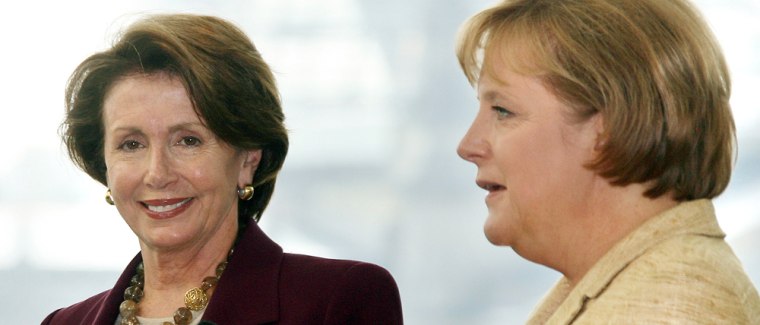The United States rejects the all-encompassing target on reduction of carbon emissions being proposed for next week's Group of Eight industrial nations summit, President Bush’s environmental adviser said Tuesday.
James Connaughton, chairman of the White House Council on Environmental Quality, said the United States is not against setting goals but prefers to focus them on specific sectors, such as reducing dependence on gasoline and cleaner coal. “The U.S. has different sets of targets,” he said.
Germany, which holds the European Union and Group of Eight presidencies, is proposing a so-called “two-degree” target, whereby global temperatures would be allowed to increase no more than 2 degrees Celsius — the equivalent of 3.6 degrees Fahrenheit — before being brought back down. Practically, experts have said that means a global reduction in greenhouse gas emissions of 50 percent below 1990 levels by 2050.
Connaughton, who is on a one-week bipartisan trip to Europe with members of the House of Representatives, said the U.S. favors “setting targets in the context of national circumstances.”
House Speaker Nancy Pelosi, who opposes Bush on climate policy and was among the congressional delegation in Berlin, urged international cooperation in tackling climate change during a meeting Tuesday with German Chancellor Angela Merkel.
Merkel plans to push President Bush at next week's Group of Eight summit for action to fight global warming.
Pelosi praises German leader
Pelosi hailed Merkel's "extraordinary leadership" in fighting climate change and agreed "that these solutions must be multilateral."
"We are trying to preserve the planet, which many in our country, including I, believe is God's creation, and we have a responsibility to preserve it," Pelosi said, speaking alongside the German leader after a meeting at the chancellery with other U.S. lawmakers.
The California Democrat earlier pointed to her delegation's weekend stop in Greenland, "where we saw firsthand evidence that climate change is a reality; there is just no denying it."
"It wasn't caused by the people of Greenland — it was caused by the behavior of the rest of the world," she said.
Scientists have noticed that Greenland's output of ice into the North Atlantic had increased dramatically, doubling over the decade that ended in 2005.
"We hope that we can all assume our responsibilities with great respect and that our administration will be open to listening to why it is important to go forward perhaps in a different way than we have proceeded in the past," she told reporters.
Call for religious help
Pelosi said faith-based organizations could play a role in battling climate change. The United States needed "the spirit of science to show us the way and faith-based organizations to help mobilize to preserve the planet," Pelosi said.
Merkel, who will host the summit of leaders from the G-8 in Heiligendamm, was diplomatic as she met with Pelosi and her bipartisan congressional delegation. The German leader said she was delighted there was "a bipartisan movement in the U.S. Congress that pays great importance to the issue of energy."
Environment Minister Sigmar Gabriel has been more blunt, voicing regret after he met Pelosi on Monday at the difficulty of achieving "concrete results" with the Bush administration.
"I think that what we could achieve is at least a mandate for negotiations — a clear mandate — for the climate conference" later this year in Bali, Indonesia, which is set to consider future action against global warming, Gabriel told ARD television.
"The United States is rejecting that as well, so far," he said, but "if we could achieve that, then I think Heiligendamm would have achieved a breakthrough."
The U.S. refused to ratify the 1997 Kyoto Protocol limiting emissions because developing countries were not included. Rising economic giants, China and India, are exempt, and the treaty says nothing about post-2012 cuts.
Bush has argued that Kyoto would harm the U.S. economy and unfairly excludes developing countries such as China and India from obligations.
Pelosi has disagreed with that decision on Kyoto, but has said she wants to work with the Bush administration rather than provoke it.
Asian bloc OKs treaty talks
In Hamburg, Asian countries, including rising global powerhouses China and India, reluctantly agreed Tuesday to back European calls for a new climate change treaty by 2009 to limit greenhouse gases after the Kyoto Protocol expires.
The deal was a step forward for Merkel’s push for a climate deal at next week’s G8 summit. But deep differences remained at the end of the meeting of foreign ministers from the European Union and Asia over whether developing countries would themselves agree to cut emissions.
Chinese Foreign Minister Yang Jiechi, speaking on behalf of all 16 Asian nations at the Hamburg talks, said the EU should not expect developing countries to share the same burden of binding cuts similar to those taken by richer nations, a move he said would be unfair and harm efforts to lift people out of poverty.
“Developed countries have a long history of industrialization and emissions,” Yang said. “We hope developed countries will make further, deeper cuts in emissions and take seriously concerns and needs of developing countries and honor their commitments to provide financial assistance and technology transfers.”
